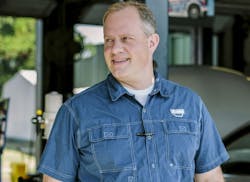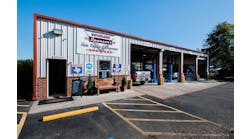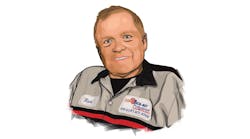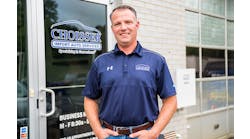“[The doctor] was saying, ‘We’re going to have to do something with your medication because your blood pressure is so out of control,’” Boyd says. Boyd admits the service advisor position isn’t for everybody. You’re answering to customers, technicians, and oftentimes, management, whether any of them are happy or not. You’re the middle man for all repairs, and you’re expected to relay information between all parties.
And because automotive repair can be an inherently stressful setting for customers and employees, Boyd says if you don’t understand how to properly communicate and handle tough situations, you’ll find that, well, your blood pressure rises. And since 2000, when he started as a service advisor, he’s found ways of not only making the repair experience less stressful for everyone else, but himself as well—to the point where his doctor is now amazed at his drastic turnaround.
“You have to be a certain kind of person to be a service advisor, and that’s true,” Boyd says. “There are a lot of sacrifices you have to make with your own personality.”
Those sacrifices have completely reshaped the way Boyd works with customers and employees every day, and the results show it’s working: Since joining European Edge in Thomasville, Ga., in January 2016, ARO jumped from $534 to an all-time high of $982 in April, and his closing ratio rests around 85 percent.
European Edge
Location: Thomasville, Ga.
Size: 2,000 square feet
Staff: 6 (3 technicians, 2 service advisors, 1 owner)
number of lifts: 5
Average Monthly Car Count: 69
Annual revenue: $670,000
You have to be to be proficient in this business, and I used to beat myself up about it at times. But what I’ve found is if you stick to a plan, that reduces the stress. I’m now very process driven and process oriented, and remain that way in every situation. You’re going to have people angry with you, technicians upset with you. You have intense emotions you have to deal with. So if you’ve got a process and you stick to it, that helps you so much.
And by the end of the day or week or month of working hard and doing your process—huh, we’ve turned a profit. We’ve grown financially. We’ve gotten rid of some dead weight with employees. And everything just feels lighter around here.
What we try to do each morning is look over our day and determine our priorities or what the potential problems could be in regard to finish times and customer expectations. I write out a list for myself of everything I need to get done. Usually I’m the only one who’s spoken with a customer, so communication between me and my shop foreman is key. I try to let him know everything I’m thinking so he can make his own executive decisions throughout the day.
We’ll hold morning meetings when they’re needed. The owner, Walter Tipton, likes me to help lead the meetings since I’m running the office. Basically we talk about the same things over and over again, drilling our processes into their heads whenever we feel they’re letting up. Slowly they’re getting more and more comfortable with it and it works for us better.
The rest of my day is interacting with customers. It’s a two-way relationship. Those customers need to be part of your family, because that job is what you’re building your whole livelihood around. If they’re not willing to work with us, we’re not afraid to fire customers and offer other shops they can go to. We want something that works in our lives. If not, it’s dragging me and my technicians down. Life is hard enough on a good day when the sun is shining.
“I’m pretty firm with customers. I give them a lot of silence. I let them make their own decisions.” —Brendan Boyd, service advisor, European Edge
It’s a balancing act. The service advisor has to maintain control of the situation. They’re the ones people look to. For lack of a better term, I have to parent the customer. If you get into something too quickly with a customer, you can lose control. So my panache is I’m able to hold back my real feelings with customers.
The customer is not always right; that’s an attitude that gets you into a lot of trouble and causes a lot of stress. You can’t let a customer walk all over you. At any time, the customer can terminate the relationship, and you have to be sensitive to that, but you also have to be OK with letting customers go.
Some of them just aren’t for you. And in my experience, anyway, they frequently go to another shop, don’t get what they want, and eventually come back to us.
Most of the time, customers are just mad at themselves. They don’t want to admit that they neglected their vehicle and that they need these repairs. If you just deal with them in a stoic manner, they realize what they’ve done is wrong. Even if they couldn’t admit it, inside they know it’s their fault and they make the right decision. I think that’s innate. It’s human nature. If you don’t pour gasoline on the fire, everybody is left to deal with it themselves. And that’s what wins people over. They feel comfortable there and they feel safe making decisions.
Few service advisors are willing to make that emotional investment. That takes a lot of vulnerability to sit there and have somebody talk really badly to you, or to have them think you’re just trying to oversell them. A lot of people won’t put up with that. But if you don't want to put up with it, there’s a cost to that. You need to find that middle ground.
At the end of my day, I go back over my list and find anything I missed. I make note of customers I need to follow up with.
Up until right before I leave, I just try to stay busy. My hope is that work ethic will rub off on the guys and we’ll become a better shop overall. We need to all be helping each other and be a family. We need to make work everything that it can be for everybody, for the customer. If we’re not a tight-knit group, our customer will see that. We’re trying to sell that we’re your place to go.



